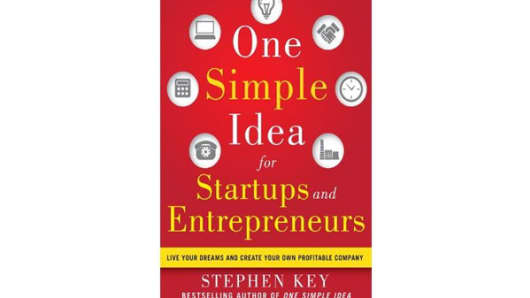GUEST AUTHOR BLOG: by Stephen Key author of "One Simple Idea for Startups and Entrepreneurs: Live Your Dreams and Create Your Own Profitable Company."
There are many people with product ideas who would love to start their own business, but never do.
A crippling fear of failure prevents them from committing their time, energy, and money to pursuing a dream.
Unfortunately, most of these people don't realize that there are many ways to quickly and efficiently test the potential of their ideas without breaking the bank.
I've spent the last thirty years perfecting a low-risk strategy to determine the strength of my ideas in the market before committing to building a business.
Does your idea have what it takes to make it?
Keep It Simple
You don't have to reinvent the wheel to create a profitable business.
In fact, my experiences have taught me that the simpler my idea is, the greater its chances of success are. Frankly put, simple ideas are easier to work with in about every imaginable way.
So, what is a simple idea?
A simple idea is easily and inexpensively manufactured, able to be demonstrated to a consumer without difficulty, small enough to be placed on a store shelf, and appealing to a large market.
Once you're sure that your idea meets the above requirements, it's a good time to begin testing its fortitude.
Are consumers willing to buy this product? And if so, how many? These two questions must be answered with data and research.
Testing Your Idea
It's incredibly important to thoroughly test your idea before investing in it further. At this point, the time you spend vetting your idea and its potential in the market could not be better spent, because it will save you from heartache and financial loss later on.
Thankfully, with a little creativity and optimism, testing your idea is not hard to do.
I recommend any number of the following, ideally in combination: reaching out to retail buyers to gain a better understanding of the market, using social media to find out what consumers need, want, and think about your idea, doing a Google product search to if there is a market for your idea (and if so, what size), attending industry trade shows, and conducting a brief limited product run.
When I began to figure out if there a was a demand for a new style and shape of guitar pick, a product idea I had almost a decade ago, I asked the manager of a local gas station to display my picks on the checkout counter.
When I returned the next day and learned (to my great amazement), that all of the picks had already been sold, I was encouraged to move forward with the idea.
This is one example of the many tests I conducted before starting the company HotPicks, which eventually generated over seven figures of revenue - all based on the incredibly simple idea to change the shape of the guitar pick.
The goal of testing your product idea is to be sure that enough people are willing to reach into their pockets to pay for it for your business to be profitable. In order to do these calculations, you will need to research how your potential idea would be made and at what approximate price.
Finding out is as simple as calling some potential manufacturers and asking a few questions. Seek out a manufacturer that is already making a similar product.
The more knowledge you gain about the market and your idea's potential place in it, the less anxiety and fear you will have about moving forward.
You might find out that your idea isn't a good fit for the market. Be willing to accept this hard truth and to walk away. Have the confidence to believe that you will come up with more ideas.
Everyone has an idea. Starting a business may seem frightening and overwhelming, but testing your idea will help take away the fear without costing you too much.
Stephen Key has successfully licensed more than 20 simple ideas that have generated billions of dollars of revenue. He is the author of the best-selling book, One Simple Idea: Turn Your Dreams into a Licensing Goldmine While Letting Others Do the Work. His second book, One Simple Idea for Startups and Entrepreneurs: Live Your Dreams and Create Your Own Profitable Company, will be available in stores this November.
Email me at bullishonbooks@cnbc.com — And follow me on Twitter @BullishonBooks


